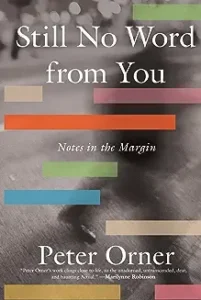Still No Word From You: Notes in the Margin by Peter Orner 2022
I finished Orner’s book late last night and had a fitful night’s sleep trying to figure out how to write this review. It’s a strange and wonderful book and a fitting accompaniment for two of his previous books that I have read, “Maggie Brown & Others” and “Am I Alone Here: Notes on Living to Read and Reading to Live”. I just re-read my reviews of those books from 2019 and 2016 respectively, and I remain an ultra-enthusiastic reader of the author.
Orner is a Professor of Creative Writing at Dartmouth and a one-time diner at our table in Vermont. We had met him when he did a book reading in Concord, MA on a cold, rainy day when we were 2 of the 6 attendees at the Concord Library. Having struck up this acquaintance, we invited him to dinner with a poet friend just before COVID shut things down. He and I share certain characteristics which probably enhanced the connection—we’re both of short stature, Jewish, grew up in the Chicago suburbs, and attended the University of Michigan, he an undergrad well after I finished medical school there. On the other hand, he came from a broken family and had negative feelings towards his father who cut him out of his will, is divorced, and is a professional writer.
And can he ever write! This book alternates 1-3 page essays about his personal history and his reading. The book has 6 sections labeled Morning, Mid-Morning, Noon, 3P.M., Dusk, and Night though it is unclear how those titles relate to the essays included in each. The recollections from his life are random and usually triggered by a stray thought from his unconscious (e.g. his grandfather’s feet) or some unimportant event. Some are funny but most are very heavy from memories about his parents’ fights to the death of a high school classmate who dove into the school swimming pool as she did every morning until her final dive into a pool that had been drained for cleaning. The title of the book, itself, is a quote from a letter his grandfather wrote while serving during WWII in the Pacific. This grandfather wrote every day to his wife couldn’t stand him and rarely wrote back; hence, the title. This anecdote gives you some sense of Orner’s search for meaning in the random quotidian events of life, a life that has not been without its challenges.
One other essay stopped me in my tracks as Orner wrote about a cousin of mine in a thinly veiled story about a kidnapping and a pizza delivery. You have to read it to understand!
The other chapters relate to Orner’s seemingly infinite capacity for reading, infinite in the number of authors and works and infinitesimal in the detail with which he focuses on a line or a word. From the well-known (Faulkner, Joyce, Kafka, Woolf, Rhys, Babel, Singer) to the obscure (Kate Zambrano, Bernadette Mayer, Allen Grossman), Orner finds meaning in these authors’ struggles to find some sense of purpose and express it clearly in difficult and often heart-breaking life stories. I particularly liked his musings on his Iowa Writers’ Workshop teachers, James Alan McPherson, Marilynne Robinson, and Andre Dubus, and his essay about the undeserved obscurity of the mid-20th C writer, Wright Morris which will hopefully finally result in my, too, discovering him.
At the end of the day, Orner’s subtitle, ‘Notes in the Margin’ summarizes this book for me. I found so many phrases, paragraphs, and essays that spoke to me, that this book is now filled with my own marginalia. I also spent quite a bit of time noting each and every author and book/poem/essay he mentions in tiny script on the endpages of the book only to discover that he, too, noted each and every reference in the book’s final pages. This list of 106 references beginning with Edna O’Brien’s ‘House of Splendid Isolation’ and ending with Larry Levis’s ‘The Selected Levis’ may well provide me with fertile options for that eternal question “What should I read next?” As with poetry, writing/copying notes in the margins proved to be an important part of my reading experience.
Orner is an important contemporary commentator on today’s literature, and I urge you to read him, both for his personal stories and even more so for his insights into writers and their works, a rich source of comfort, discomfort, and perhaps, if we’re lucky, wisdom.



